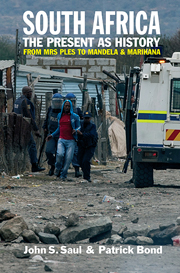Book contents
- Frontmatter
- Dedication
- Contents
- Introduction: South Africa in History
- Part I What's Past is Prologue: From the Beginnings to 1994
- Part II The Present as History: Post-Apartheid and Post-1994
- 4 Contradictions Subside then Deepen: Accumulation and Class Conflict, 1994–2000
- 5 Consolidating the Contradictions: From Mandela to Marikana, 2000–2012
- Part III Conclusions: The Future as History
- Bibliography
- Index
5 - Consolidating the Contradictions: From Mandela to Marikana, 2000–2012
from Part II - The Present as History: Post-Apartheid and Post-1994
Published online by Cambridge University Press: 05 December 2015
- Frontmatter
- Dedication
- Contents
- Introduction: South Africa in History
- Part I What's Past is Prologue: From the Beginnings to 1994
- Part II The Present as History: Post-Apartheid and Post-1994
- 4 Contradictions Subside then Deepen: Accumulation and Class Conflict, 1994–2000
- 5 Consolidating the Contradictions: From Mandela to Marikana, 2000–2012
- Part III Conclusions: The Future as History
- Bibliography
- Index
Summary
The evolution of the South African state and society in the early twenty-first century confirmed the more pessimistic predictions: neo-liberalism would fail, thus leading to systemic corruption (sometimes termed neo-patrimonialism), followed by open ruptures thanks to extreme inequality, unemployment and low pay in varied communities and workplaces. The Marikana massacre on August 16, 2012, reflected these trends, as the nextchapter reports. However, the story would have been yet more grim if, during the dozen years after 2000, Pretoria had not adopted what we can characterize as ‘tokenistic welfarism’ in several social policy innovations. Most important was a victory won by civil society activists against President Thabo Mbeki that led to free access to AIDS medicines and then to a dramatic rise in life expectancy. Some social policies, such as Free Basic Services for lifeline water and electricity, were of global importance, yet at the same time suffered severe limitations because of their tokenistic character. All of these developments reflected the overarching problem of neo-liberalism in public policy, operating within a structurally dysfunctional economy that excluded around 40 per cent of the working-age population from employment, overlaid with new gender and race biases, not to mention extreme disregard for the environment.
Ultimately, as we will see, the extreme political turmoil within the ruling party – with three presidents serving in the course of nine months in 2008-09 following the prior year's ‘palace coup’ against Mbeki at the Polokwane conference of the African National Congress – did not lead to changes in core state processes.
- Type
- Chapter
- Information
- South Africa - The Present as HistoryFrom Mrs Ples to Mandela and Marikana, pp. 176 - 210Publisher: Boydell & BrewerPrint publication year: 2014

